Nicholas Chrimes, Professor of History at University of Cambridge, gave a lecture on “Soul and Spirit of Cambridge and European Education” to the students of Zhejiang University in the Classroom 201, East Building 5 at 18:30, November 9th, 2016.
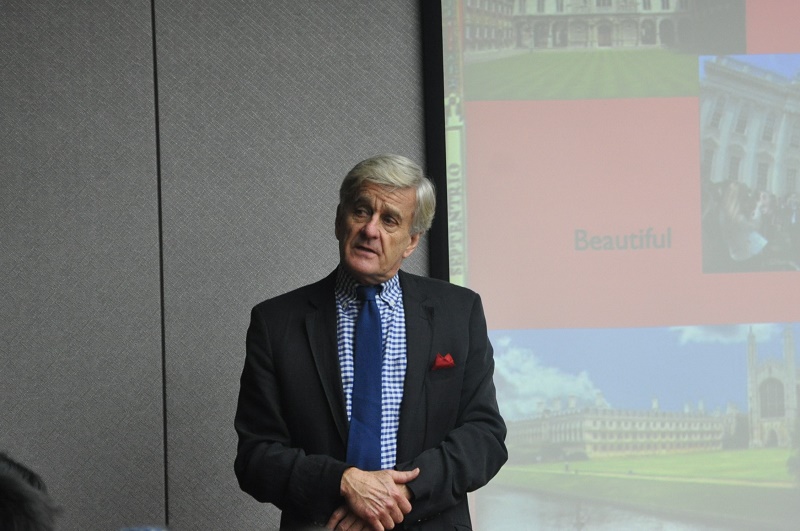
Prof. Nicholas, a historian with extensive interests and columnist for Chinese Weekly, has in-depth research and a unique perspective on British culture, especially the history of education and religion. The Chinese version of his new book The 800-year Story of the University and Town of Cambridge has been published by SDX Joint Publishing Company. He has also lectured at prestigious Chinese universities like Peking University and Tsinghua University and been interviewed in the program Dialogue on CCTV-9.
Prof. Nicholas told us about the history of University of Cambridge, the spirit of European universities and the connection between University of Cambridge and China in a relaxing atmosphere. Students benefited a lot from the lecture and the Q&A interaction.
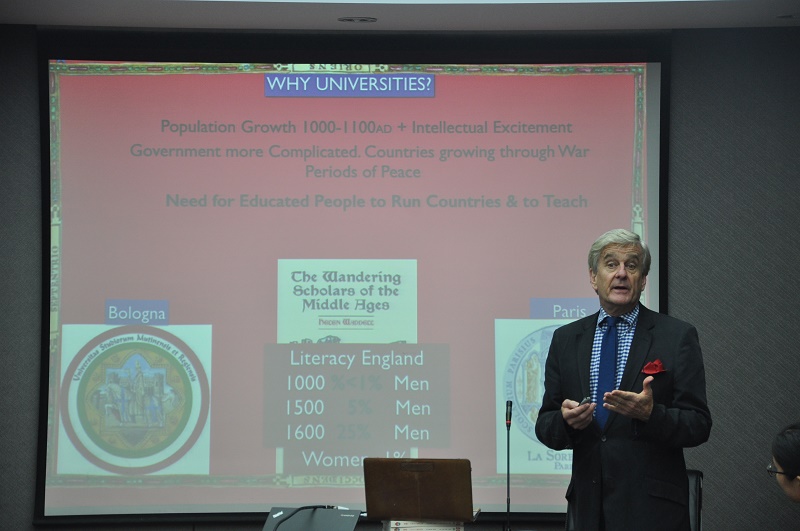
First of all, Prof. Nicholas introduced the Christian background and historic development of University of Cambridge. University of Cambridge was founded by a group of teachers who escaped from University of Oxford to avoid fighting in Cambridge, a town with a strong Christian color, in 1209. Approved by the Pope, Cambridge had the right of self-management to cultivate students into elites who were good at national governance and Christianity service. Because of its religious background, there used to be 29 churches with monasteries as the schoolhouse, monks as teachers and young priest descendants as students to serve God. In the 16th century, Cambridge focused the intelligence training of the noblemen and Latin as its language of instruction. Its main spirits were aristocratic logic and Christian faith, which were the schooling philosophy of European universities at that time. In the 18th century, Rousseau’s thoughts also had some impact on Cambridge. From 1830 to 1970, the core ideas of Christianity were in the first place in its spirits, followed by the behavioral norms of elite gentry and academic achievements. Cambridge valued group activities in order to foster students’ cooperative ability to be better adapted to the governmental work.
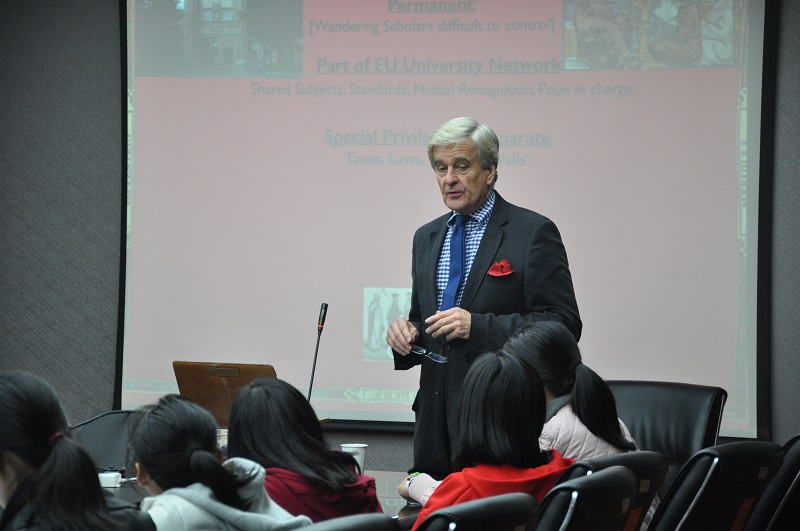
The daily life in University of Cambridge was full of Christian characteristics―there was a strict timetable and students should put all their energy on learning and praying without any entertainment. As Christians, students were not even allowed to marry until the 19th century, which may be the reason why the word “bachelor” means both a bachelor’s degree and a single man. Lectures were given in small classes in the church with serious atmosphere, teachers sitting in the chair and students sitting in the audience. Students should pay for each course at its end. Cambridge, like another world behind the wall, had different laws and fewer taxes compared to the outside. In addition, Prof. Nicholas mentioned that girls were captivated as people were afraid they would be seducing college students, which was actually the male-centered elitism influenced by ancient Greek and Roman thoughts.
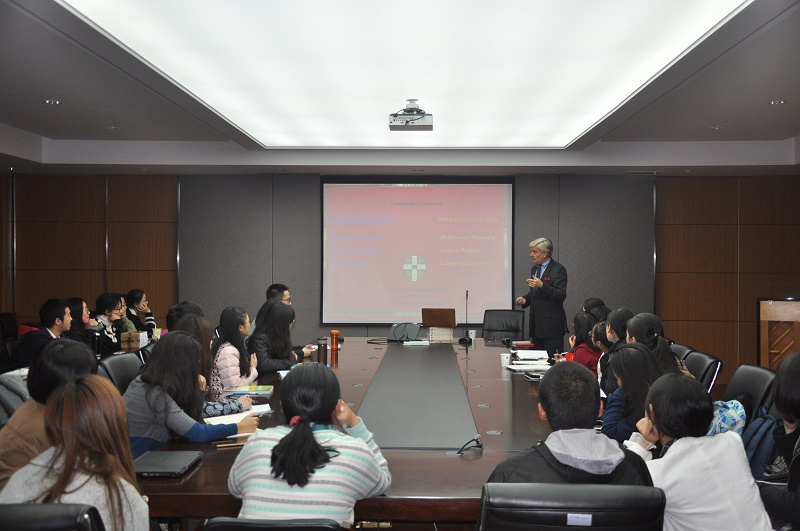
Prof. Nicholas then gave a detailed introduction to the birth and development of European universities. He summarized the main features of European universities as elitism and religionism through a painting of over 800 years ago (wealthy parents brought children to the monastery to receive education and its teachers were monks). Because of the complicated social function and governmental structure caused by the rapid increase of population, coupled with wars, the society was in urgent need of educated scholars to manage the country and impart knowledge, which led to the birth of modern universities.
Universities vigorously developed in European countries. Up to the 16th century, there had been 63 universities in Europe. In the 17th century, there were respectively 23 and 15 universities in Italy and Germany, two late-founded countries, 13 in France and 4 in Scotland. England still had only two universities: University of Cambridge and Oxford. The two have been in a monopoly position in 600 years, which explains why they can achieve high-level achievements from a historical perspective.
Next, Prof. Nicholas talked about the contemporary University of Cambridge and its links with China. In his view, universities, which serve economy nowadays, should conform to globalization, raise funds to support research and maintain its purity independent from politics when facing present challenges. He believed that the status of Cambridge today owes a lot to wisdom, wealth and pioneering spirit.
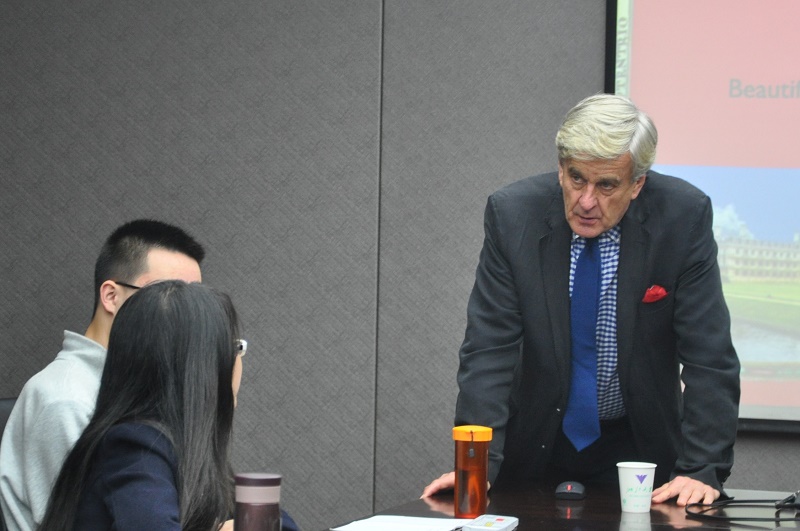
There is a long history of Chinese studies in University of Cambridge which began to study Asian cultures in the 19th century, including China’s imperial examination system, and considers it similar to the traditional enrollment philosophy of British universities. Cambridge attaches great importance to its relationship with China. Shen Dunhe, one of its Asian students, later became the founder of the Red Cross Society of China. It also set up stone carvings for Confucius and Chinese who studied in Cambridge, such as Xu Zhimo and Jin Yong. There is Museum of Chinese Modern Art and three Chinese gardens on campus. Cambridge has held Chinese Poetry Festival every year since 2015 and founded Cambridge Peking University China Center. These links, self-organized by Cambridge, are unique and profound.
Finally, Prof. Nicholas gave enthusiastic replies to the students’ questions in Q&A session and presented his new book The 800-year Story of the University and Town of Cambridge to them. More students will have a deeper understanding of the culture, history and schooling philosophy of University of Cambridge through this lecture.
Youth League Committee of School of International Studies
November 10, 2016



